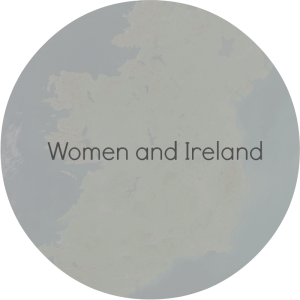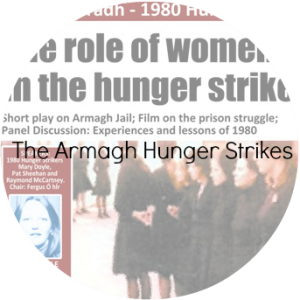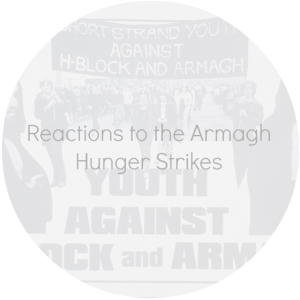Women and Ireland: The Past
There is history of marginalization of women in Northern Ireland. Their society imposed a strict, religiously puritanical concept of how women should behave. This patriarchal society impacted their perceptions of themselves. The added violence of the times further shaped the identity of the Northern Irish women. It wasn’t until the late 60’s, 70’s and 80’s that women began to make their mark on society, using politics as an outlet.
The 60’s:
Young girls went to school until the age of 14 or 15 and immediately after, went to work in textile mills or factories in order to support their families. From the age of 18 to 22 they were getting married and starting a family of their own. In 1968 the Civil Rights movement began, up to this point the there wasn’t much interference from women in politics. The Civil Rights movement began as a result of inequality between the Catholics and the Protestants, especially when it came to job distribution. Movements were made against this inequality and the policies, and governing body that kept it going. It wasn’t very popular at this time for women to be involved in the civil rights movement politically, their role was mostly just one of support. However, this did not mean that women weren’t involved at all
Example #1:
Bernadette Devlin was born in 1947 into a Catholic family. She grew up knowing the discrimination that came along with being a Catholic. She developed a Marxist view when it came to society and believed in a united Ireland where people had both civil and religious rights. When the Civil Rights movement began in 1968, she was a part of it. In October 1968 she chose to be a part of a non-violent march in Derry for civil rights, which was broken up by the police. After this she became a part of the People’s Democracy and was elected into parliament in 1969 and also released the book “The Price of my soul,” where she talked about the discrimination of Catholics in Northern Ireland. She was involved in the Battle of the Bogside riot, ” leading the people of the Bogside in rebellion during the Civil Rights riots of 1969 against the Royal Ulster Constabulary. (McCafferty)” She would later be imprisoned for this in 1970.
Example #2:
Brigid Bond: New Years Eve 1968, she planted herself in the mayor chamber in Derry city, walking from the slum she lived in and made dinner for families who decided to join in her protest. “at midnight she announced to revelers in the city centre square that she intended to stay in her marbled fastness until she and her companions were re-housed in adequate accommodation. They were rehoused and shortly after the local government authority was abolished (McCafferty).“
Example #3:
The Factory Women of Derry: “the Minister of home affairs for the stormont parliament, William Craig, forbade the people of Derry to march through their own town and so the factory women downed their tools and converged on the city centre, marching in and out of the gates of the walled city until the ban was in tatters (McCafferty)”
In 1968 women were beginning to assert their opinions on the state of Northern Ireland at the time. Although many women had not yet come into the fight, they would soon follow. The problems of Northern Ireland would only get worse, inciting women to make their voices heard.
The 70’s:
During the 70’s women began to gain momentum in the fight against imperialism. They were asserting themselves in society. Not as just the women that society wanted them to be, but as who they wanted to be. In 1971 Internment was reintroduced, men and women assumed to be involved with the IRA were sent to internment camps. There was a lot of stress put on the women during this time to keep up with the household, children, and support their family members who were in prison. However, women, being more involved, were also being sent to prison. Unlike the men, they did not have the luxury of having someone home to take care of the kids, and had to sort that out before they were imprisoned. Many women during this time period survived as single mothers, their husbands often unfaithful while they were away and abusive when home. With all the tumult going on in the 70’s, the women decided to form groups to help them cope. These groups gave women a support system and allowed them to become more involved in the political aspect of the fight against imperialism.
Prominent women’s groups formed in the 70’s:
Women Against Imperialism: A group created to support the fight against the British, with a focus on the view of women at the time from the IRA’s perspective. They met once a week on Tuesday’s to talk about the problems that women had to deal with everyday. These problems included, chauvinism, abortion, and lesbianism (McCafferty). The group fought for the rights of women just as much as they fought for the end of Imperialism.
– 1978: a club was opened up that was named after a woman who had been shot by a member of the British army and paralyzed. It was a rule in clubs that men were the only ones allowed in on Sunday’s. Even the woman whom the club was named after was not allowed in. The Women Against Imperialism picketed the club, being called whores by the men. Their protest created a lot of publicity and they gained recognition as a result. The Republicans saw them as a threat, even though the women were fighting for the same thing that they were. After this they tried to shut down every attempt the women made in publicizing certain issues.
– 1979: The Women Against Imperialism held a demonstration outside of Armagh jail to draw attention to the protesting women within the prison. Around this time women in Armagh had begun to reject criminalization, asking to be locked up in a different wing. Life in these cells were even more brutal than the cells they lived in previously. They were in their cells for 19 hours a day. “Toilets were a right not a privilege (McCafferty),” and some women refused to eat. The Women Against Imperialism held the demonstration on International Women’s Day, when they stood outside the prison and sang. The cops took notice to it though and ended up arresting the women involved, breaking up the protest. After this demonstration the world began to take notice, “People outside the North were aware now that a group of independent political women were engaged in the struggle. Women’s groups and socialist groups from Britain asked them to come over and speak. (McCafferty).”
Peace Women: Formed in 1976 when three kids were hit by a car. The man driving the car was a part of the IRA and was shot by a member of the British Army. Women and men alike were outraged, “thousands of people rallied to the scene of the tragedy and the Peace Women were born (McCafferty).” The Peace women tended to get more publicity than any other group in the beginning. They were fighting for non violence, something that everyone could stand behind. They were examples of the Idealistic woman of Northern Ireland, supporting their men and working to end violence.
Relatives Action Committee: Formed in 1976, “group of women that pointed out the practical link between the still rising prison population and the widespread political turmoil – They fought for the retention of the special category status as living proof of the political root of the North’s troubles (McCafferty).” The women who formed the group were the wives and mothers of those in jail, or had been imprisoned themselves at some point. They worked to expose the faults of the system used to put their relatives in jail. They knew that many people were being imprisoned without much, if any, evidence of their crimes.
Internment had such a profound impact on women. Women, having to get used to being alone, became more independent. They were forging their way in society, and gaining a confidence that had not been there in the previous decade. Although they had to deal with abusive and/or not present husbands, their children being in jail, and a society that did not support their political efforts to end imperialism, they remained steadfast.
The 80’s:
In the 80’s, women were at a point where they had the confidence to voice their opinions on the matter of Imperialism and Feminism. Although women fought for the rights of the people of Northern Ireland, they were also asserting their power as women in the process. They were in the media more, attracting more attention to Northern Ireland. They began to be seen as more than the role their patriarchal society had given them. They were asserting themselves as strong women, not symbols.
Dirty Protest: On February 7th 1980 all prisoners, besides the women on protest in another wing, were locked into their cells. Dinner was given to women protesting, while male officers came in to search their cells. Three women tried to run back to their cells but were stopped and beaten. At this point all the women were throwing their plates of food at the officers and so the officers forcefully put them into two separate rooms. When the women finally returned to their cells, they were wrecked. A few officers then proceeded to come into three of the women’s cells and drag them out. They were to be interrogated on the ground floor of the jail. For 3 days these women were locked up in dirty cells with only a mattress. They were not allowed to be let out for exercise, use the bathroom, and they were only given food on one of the three days. On the 13th of February of that same year, all the women were moved to a different part of the wing. Here they would be locked up for 23 hours a day. The windows in the cells were boarded up and they only had spy holes to look out of. They went to the bathroom in chamber pots that were not picked up and emptied for long periods of time so that they had to lie in their own filth. Tampons were thrown in unwrapped and would remain on the ground of the cell until they were needed. Women refused to allow themselves to be criminalized and started the dirty protest. “Women began to use their waste as a form of communication and menstrual blood. – News began to seep out and then the question was asked of who are these women and how did they get there (McCafferty)?”
The women of Ireland have grown throughout the decades, separating themselves from the Rebublican/Unionist view of the ideal woman. A woman that wasn’t ideal in the women of Northern Ireland’s eyes, so much as obedient. In the 80’s they had gained the confidence. They would no longer allow themselves to be symbols. They fought against society and the media confining their voices, making political statements to the world that they were as much a part of of the war within their nation as the men.



